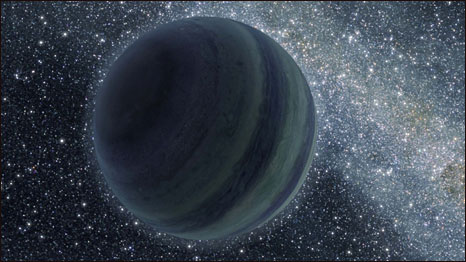Lonely Planet “流浪星球”
Lonely Planet “流浪星球”
By Neil Bowdler, BBC News

The planet could be have been ejected from an infant solar system
媒體英語會(huì)帶大家一起學(xué)習(xí) BBC 撰稿人在報(bào)道世界大事時(shí)常用到的單詞和短語。
Background: 日本宇航員稱他們發(fā)現(xiàn)了眾多沒有環(huán)繞恒星運(yùn)行的“行星”。刊登在《自然》雜志中的文章介紹說,科學(xué)家們發(fā)現(xiàn)了10顆與木星大小相同的,并處于太陽系之外的行星。
收聽與下載
The researchers claim to have found 10 dark gas giants floating at the heart of our Milky Way without any nearby star to illuminate them. Astronomers have long suspected such rogue planets existed, but this is the first evidence, and the Japanese team believe there could be as many out there as there are stars, a finding likely to shock many.
How they came into being is unclear. One theory is that they may be cast-outs, forgotten worlds ejected from infant solar systems by gravitational forces or interplanetary collisions.
Strictly speaking, the objects aren't even planets, as by definition planets orbit a star or the remains of one. But should the researchers have their calculations right, then strange dark orbs which look very much like planets are out there, far far from any shining star.
Glossary 詞匯表 (收聽發(fā)音, 請單擊英語單詞)
- a gas giant巨大的氣團(tuán)
- rogue流浪的,脫離群體的
- to come into being怎么形成的
- a cast-out(被)驅(qū)逐出來的
- to be ejected from驅(qū)逐,逐出
- a gravitational force地心引力
- an interplanetary collision 行星之間的碰撞
- strictly speaking嚴(yán)格來說
- the remains of某物的殘余,殘骸
- an orb圓形天體物